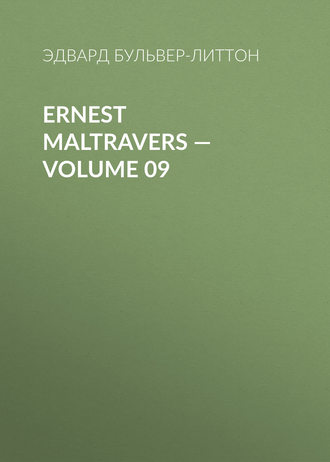
Эдвард Бульвер-Литтон
Ernest Maltravers — Volume 09
At length Colonel Danvers entered. Maltravers drew him aside, and they left the club.
"Danvers," said the latter, "the time in which I told you I should need your services is near at hand; let me see you, if possible, to-night."
"Certainly—I shall be, at the House till eleven. After that hour you will find me at home."
"I thank you."
"Cannot this matter be arranged amicably?"
"No, it is a quarrel of life and death."
"Yet the world is really growing too enlightened for these old mimicries of single combat."
"There are some cases in which human nature and its deep wrongs will be ever stronger than the world and its philosophy. Duels and wars belong to the same principle; both are sinful on light grounds and poor pretexts. But it is not sinful for a soldier to defend his country from invasion, nor for man, with a man's heart, to vindicate truth and honour with his life. The robber that asks me for money I am allowed to shoot. Is the robber that tears from me treasures never to be replaced, to go free? These are the inconsistencies of a pseudo-ethics, which, as long as we are made of flesh and blood, we can never subscribe to."
"Yet the ancients," said Danvers, with a smile, "were as passionate as ourselves, and they dispensed with duels."
"Yes, because they resorted to assassination!" answered Maltravers, with a gloomy frown. "As in revolutions all law is suspended, so are there stormy events and mighty injuries in life which are as revolutions to individuals. Enough of this—it is no time to argue like the schoolmen. When we meet you shall know all, and you will judge like me. Good day!"
"What, are you going already? Maltravers, you look ill, your hand is feverish—you should take advice."
Maltravers smiled—but the smile was not like his own—shook his head, and strode rapidly away.
Three of the London clocks, one after the other, had told the hour of nine, as a tall and commanding figure passed up the street towards Saxingham House. Five doors before you reach that mansion there is a crossing, and at this spot stood a young man, in whose face youth itself looked sapless and blasted. It was then March;—the third of March; the weather was unusually severe and biting, even for that angry month. There had been snow in the morning, and it lay white and dreary in various ridges along the street. But the wind was not still in the keen but quiet sharpness of frost; on the contrary, it howled almost like a hurricane through the desolate thoroughfares, and the lamps flickered unsteadily in the turbulent gusts. Perhaps it was the blasts which increased the haggardness of aspect in the young man I have mentioned. His hair, which was much longer than is commonly worn, was tossed wildly from cheeks preternaturally shrunken, hollow, and livid: and the frail, thin form seemed scarcely able to support itself against the rush of the winds.
As the tall figure, which, in its masculine stature and proportions, and a peculiar and nameless grandeur of bearing, strongly contrasted that of the younger man, now came to the spot where the streets met, it paused abruptly.
"You are here once more, Castruccio Cesarini; it is well!" said the low but ringing voice of Ernest Maltravers. "This, I believe, will not be our last interview to-night."
"I ask you, sir," said Cesarini, in a tone in which pride struggled with emotion—"I ask you to tell me how she is; whether you know—I cannot speak—"
"Your work is nearly done," answered Maltravers. "A few hours more, and your victim, for she is yours, will bear her tale to the Great Judgment Seat. Murderer as you are, tremble, for your own hour approaches!"
"She dies and I cannot see her! and you are permitted that last glimpse of human perfectness; you who never loved her as I did; you—hated and detested! you—"
Cesarini paused, and his voice died away, choked in his own convulsive gaspings for breath.
Maltravers looked at him from the height of his erect and lofty form, with a merciless eye; for in this one quarter, Maltravers had shut out pity from his soul.
"Weak criminal!" said he, "hear me. You received at my hands forbearance, friendship, fostering and anxious care. When your own follies plunged you into penury, mine was the unseen hand that plucked you from famine, or the prison. I strove to redeem, and save, and raise you, and endow your miserable spirit with the thirst and the power of honour and independence. The agent of that wish was Florence Lascelles; you repaid us well! a base and fraudulent forgery, attaching meanness to me, fraught with agony and death to her. Your conscience at last smote you; you revealed to her your crime—one spark of manhood made you reveal it also to myself. Fresh as I was in that moment from the contemplations of the ruin you had made, I curbed the impulse that would have crushed the life from your bosom. I told you to live on while life was left to her. If she recovered, I could forgive; if she died, I must avenge. We entered into that solemn compact, and in a few hours the bond will need the seal: it is the blood of one of us. Castruccio Cesarini, there is justice in Heaven. Deceive yourself not; you will fall by my hand. When the hour comes, you will hear from me. Let me pass—I have no more now to say."
Every syllable of this speech was uttered with that thrilling distinctness which seems as if the depth of the heart spoke in the voice. But Cesarini did not appear to understand its import. He seized Maltravers by the arm, and looked in his face with a wild and menacing glare.
"Did you tell me she was dying?" he said. "I ask you that question: why do you not answer me? Oh, by the way, you threaten me with your vengeance. Know you not that I long to meet you front to front, and to the death? Did I not tell you so—did I not try to move your slow blood—to insult you into a conflict in which I should have gloried? Yet then you were marble."
"Because /my/ wrong I could forgive, and /hers/—there was then a hope that hers might not need the atonement. Away!"
Maltravers shook the hold of the Italian from his arm, and passed on. A wild, sharp yell of despair rang after him, and echoed in his ear as he strode the long, dim, solitary stairs that led to the death-bed of Florence Lascelles.
Maltravers entered the room adjoining that which contained the sufferer—the same room, still gay and cheerful, in which had been his first interview with Florence since their reconciliation.
Here he found the physician dozing in a /fauteuil/. Lady Florence had fallen asleep during the last two or three hours. Lord Saxingham was in his own apartment, deeply and noisily affected; for it was not thought that Florence could survive the night.
Maltravers sat himself quietly down. Before him, on a table, lay several manuscript books, gaily and gorgeously bound; he mechanically opened them. Florence's fair, noble Italian characters met his eye in every page. Her rich and active mind, her love for poetry, her thirst for knowledge, her indulgence of deep thought, spoke from those pages like the ghosts of herself. Often, underscored with the marks of her approbation, he chanced upon extracts from his own works, sometimes upon reflections by the writer herself, not inferior in truth and depth to his own; snatches of wild verse never completed, but of a power and energy beyond the delicate grace of lady-poets; brief, vigorous criticisms on books, above the common holiday studies of the sex; indignant and sarcastic aphorisms on the real world, with high and sad bursts of feeling upon the ideal one; all chequering and enriching the various volumes, told of the rare gifts with which this singular girl was endowed—a herbal, as it were, of withered blossoms that might have borne Hesperian fruits. And sometimes in these outpourings of the full mind and laden heart were allusions to himself, so tender and so touching—the pencilled outline of his features, traced by memory in a thousand aspects—the reference to former interviews and conversations—the dates and hours marked with a woman's minute and treasuring care!—all these tokens of genius and of love spoke to him with a voice that said, "And this creature is lost to you, forever: you never appreciated her till the time for her departure was irrevocably fixed!"
Maltravers uttered a deep groan; all the past rushed over him. Her romantic passion for one yet unknown—her interest in his glory—her zeal for his life of life, his spotless and haughty name. It was as if with her, Fame and Ambition were dying also, and henceforth nothing but common clay and sordid motives were to be left on earth.
How sudden—how awfully sudden had been the blow! True, there had been an absence of some months in which the change had operated. But absence is a blank, a nonentity. He had left her in apparent health, in the time of prosperity and pride. He saw her again—stricken down in body and temper—chastened—humbled—dying. And this being, so bright and lofty, how had she loved him! Never had he been so loved, except in that morning dream, haunted by the vision of the lost and dim-remembered Alice. Never on earth could he be so loved again. The air and aspect of the whole chamber grew to him painful and oppressive. It was full of her—the owner! There the harp, which so well became her muse-like form that it was associated with her like a part of herself! There the pictures, fresh and glowing from her hand,-the grace—the harmony—the classic and simple taste everywhere displayed.
Rousseau has left to us an immortal portrait of the lover waiting for the first embraces of his mistress. But to wait with a pulse as feverish, a brain as dizzy, for her last look—to await the moment of despair, not rapture—to feel the slow and dull time as palpable a load upon the heart, yet to shrink from your own impatience, and wish that the agony of suspense might endure for ever—this, oh, this is a picture of intense passion—of flesh and blood reality—of the rare and solemn epochs of our mysterious life—which had been worthier the genius of that "Apostle of Affliction"!
At length the door opened; the favourite attendant of Florence looked in.
"Is Mr. Maltravers there? Oh, sir, my lady is awake and would see you."
Maltravers rose, but his feet were glued to the ground, his sinking heart stood still—it was a mortal terror that possessed him. With a deep sigh he shook off the numbing spell, and passed to the bedside of Florence.
She sat up, propped by pillows, and as he sank beside her, and clasped her wan, transparent hand, she looked at him with a smile of pitying love.
"You have been very, very kind to me," she said, after a pause, and with a voice which had altered even since the last time he heard it. "You have made that part of life from which human nature shrinks with dread, the happiest and the brightest of all my short and vain existence. My own clear Ernest—Heaven reward you!"
A few grateful tears dropped from her eyes, and they fell on the hand which she bent her lips to kiss.
"It was not here—nor amidst the streets and the noisy abodes of anxious, worldly men—nor was it in this harsh and dreary season of the year, that I could have wished to look my last on earth. Could I have seen the face of Nature—could I have watched once more with the summer sun amidst those gentle scenes we loved so well, Death would have had no difference from sleep. But what matters it? With you there are summer and Nature everywhere!"
Maltravers raised his face, and their eyes met in silence—it was a long, fixed gaze, which spoke more than all words could. Her head dropped on his shoulder, and there it lay, passive and motionless, for some moments. A soft step glided into the room—it was the unhappy father's. He came to the other side of his daughter, and sobbed convulsively.
She then raised herself, and even in the shades of death, a faint blush passed over her cheek.
"My good dear father, what comfort will it give you hereafter to think how fondly you spoiled your Florence!"
Lord Saxingham could not answer: he clasped her in his arms and wept over her. Then he broke away—looked on her with a shudder—
"O God!" he cried, "she is dead—she is dead!"
Maltravers started. The physician kindly approached, and, taking Lord Saxingham's hand, led him from the room—he went mute and obedient like a child.
But the struggle was not yet past. Florence once more opened her eyes, and Maltravers uttered a cry of joy. But along those eyes the film was darkening rapidly, as still through the mist and shadow they sought the beloved countenance which hung over her, as if to breathe life into waning life. Twice her lips moved, but her voice failed her; she shook her head sadly.
Maltravers hastily held to her mouth a cordial which lay ready on the table near her, but scarce had it moistened her lips, when her whole frame grew heavier and heavier, in his clasp. Her head once more sank upon his bosom—she thrice gasped wildly for breath—and at length, raising her hand on high, life struggled into its expiring ray.
"/There/—above!—Ernest—that name—Ernest!"
Yes, that name was the last she uttered; she was evidently conscious of that thought, for a smile, as her voice again faltered—a smile sweet and serene—that smile never seen but on the faces of the dying and the dead—borrowed from a light that is not of this world—settled slowly on her brow, her lips, her whole countenance; still she breathed, but the breath grew fainter! at length, without murmur, sound, or struggle, it passed away—the head dropped from his bosom—the form fell from his arms-all was over!






